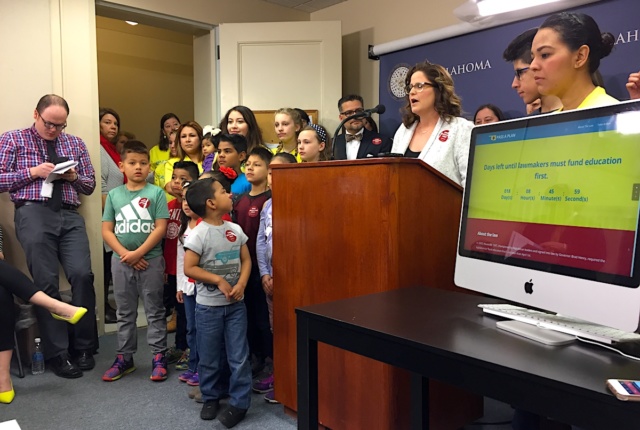
“My students have literally asked me why our state’s lawmakers don’t care about them.”
Nina Coerver’s words rang through a crowded press conference this morning. The Oklahoma Education Association and Stand For Children Oklahoma had called for lawmakers to meet a consequence-free deadline to “fund education first.” Passed into law circa 2003, the April 1 deadline has not been met during the past decade.
A history teacher at Westmoore High School, Coerver said she has learned a great deal this school year while facing tight classroom budgets.
“I’ve learned that file folders, tape, staplers and copy paper are expensive,” she said. “I’ve learned that I’m incredibly lucky that my biggest class is only 34 students.”
Coerver said uncertain education funding directly affects course offerings, class resources and teacher employment.
“I think what people don’t understand is that it’s impacting our kids,” she said following Monday’s press conference. “I teach in Moore, and while we’re still struggling, I think we’re better off than more rural districts and urban districts.”
‘No ramifications for lawmakers’ on deadline
Amber England, executive director of the state’s Stand For Children chapter, told media members that the fund education first deadline was proposed initially by Republicans when they were in the minority. She said its intent was to “give school districts financial certainty” as they planned for subsequent years.
“If they don’t have that critical information, they don’t know what’s going to happen,” England said. “Are they going to have to lay off more teachers? Are they going to have to end AP classes in high schools? Are they going to have to cut arts and PE?”
She said average Oklahomans have to follow the law, and she said the Legislature should as well.
“There’ve been no ramifications for lawmakers not actually following this law,” England said. “You passed the law, so follow the law. It’s pretty simple.”
‘A good idea sometimes isn’t feasible’
With the exception of Rep. Kevin Calvey (R-OKC), who returned to office after a hiatus, no member of the 2017 Oklahoma Legislature was around in 2003 when legislators established the April 1 deadline.
Asked Monday what they thought about the situation, multiple lawmakers pointed out the functional challenges of finalizing an education budget before various revenue-raising proposals have worked their ways through the process.
“Unfortunately, something that’s a good idea sometimes isn’t feasible,” said. Rep. John Paul Jordan (R-Yukon). “Quite honestly, I think we would all love to be done with the budget in the next couple of weeks.”
But Jordan pointed to many reasons that remains unlikely, adding that education would likely take a “drastic cut if its budget came out before all other revenue decisions.”
Freshmen lawmakers like idea, have doubts
Asked their thoughts, two freshmen lawmakers also expressed hesitation about calls to meet the April 1 deadline, despite their personal support for public education.
“I know I ran on public education and being very supportive of public education,” said Rep. Mike Osburn (R-Edmond). “I think what you have here are two things sort of moving at the same time. You have what is a deadline that is very difficult to meet when you have all of the other moving parts for the budget that can’t be finalized until some time later on in the session.”
Rep. Tammy West (R-OKC) said she sees why the April 1 deadline is likely untenable, despite this being her first session. She also said she has spoken to school superintendents who have offered suggestions for tweaking it.
“They realize our budget has not been stable the last several years. Everybody’s struggling: Families, businesses, the state,” West said. “One of their suggestions — and I think it’s a very wise one — is knowing the minimum they’re going to get. They understand that things are in flux. I think that’s an idea we could explore.”
Other bills complicate deadline
England and Oklahoma Education Association president Alicia Priest both said the issue has been complicated by the House’s passage of HB 1114 — a three-year teacher pay-raise plan — without the identification of dedicated funding.
“If they don’t have the identified revenue year after year to fund that pay raise, it’s not really worth the paper it’s written on,” England said at the press conference.
Dave Bond, CEO of OCPA Impact, has been advocating for the teacher pay-raise plan from a conservative perspective this session, and he said the big deals necessary for raising state revenue inevitably take time. That includes the effort to increase teacher pay.
“I don’t see how it can be done without substantial reform on wind subsidies,” Bond said, adding that HB 2298’s passage last week is just one of several options to raise revenue by decreasing wind subsidies.
England also mentioned HB 2298 in her remarks, but she and Jordan both acknowledged that it and other revenue-raising measures still have a ways to go in the process. In other words, they likely will not be final until after April 1.
“If we’re going to keep the April 1 deadline, then we need to roll back the other deadlines where we get the final budget numbers,” Jordan said.





















